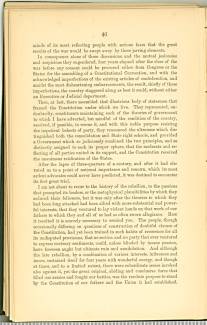Collection Name
About
minds of its most reflecting people with serious fears that the great results of the war would be swept away by these jarring elements.
In consequence alone of these dissensions, and the mutual jealousies and suspicions they engendered, four years elapsed after the close of the war before any consent could be procured either from Congress or the States for the assembling of a Constitutional Convention, and with the acknowledged imperfections of the existing articles of confederation, and amidst the most disheartening embarrassments, the result, chiefly of those imperfections, the country staggered along as best it could, without either an Executive or Judicial department.
Then, at last, there assembled that illustrious body of statesmen that framed the Constitution under which we live. They represented, undoubtedly, constituents maintaining each of the theories of government to which I have adverted, but mindful of the condition of the country, resolved, if possible, to rescue it, and with this noble purpose resisting the impatient behests of party, they renounced the ultraisms which distinguished both the consolidation and State right schools, and provided a Government which so judiciously combined the two principles, and so distinctly assigned to each its proper sphere, that the moderate and reflecting of all parties united in its support, and the Constitution received the unanimous ratification of the States.
After the lapse of three-quarters of a century, and after it had elevated us to a point of national importance and renown, which its most ardent advocates could never have predicted, it was destined to encounter its first great trial.
I am not about to recur to the history of the rebellion, to the passions that prompted its leaders, or the metaphysical plausibilities by which they seduced their followers, but it was only after the theories to which they had been long attached had been allied with more substantial and powerful interests, that they ventured to lay violent hands on that work of our fathers to which they and all of us had so often sworn allegiance. How it resulted it is scarcely necessary to remind you. The people, though occasionally differing on questions of construction of doubtful clauses of the Constitution, had yet been trained in such habits of reverence for all its undisputed provisions, that no section and no party that ever ventured to express contrary sentiments, could, unless blinded by insane passion, have foreseen aught but ultimate ruin and annihilation. And although the late rebellion, by a combination of various interests, influences and issues, sustained itself for four years with wonderful energy, and though at times, and to a limited extent, there were subordinate issues invoked also against it, yet the great original, abiding and conclusive force that filled our armies and fought our battles, was the resolute purpose to stand by the Constitution of our fathers and the Union it had established.
